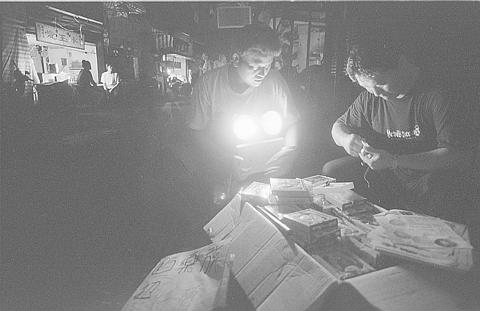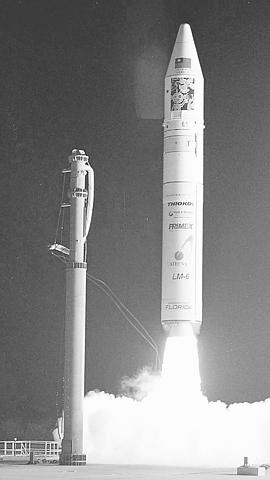1. The 921 earthquake: September 21
Without question, the massive, 7.3 earthquake that struck Taiwan at 1:47 on Sept. 21 was the single most disastrous, destructive, talked-about event of the past 12 months. The tremor, which killed over 2,400 people and left more than 100,000 others homeless, was the most destructive of the century; losses have been estimated at as much as $NT14 billion.
Despite the massive devastation and suffering wrought by the quake -- which prompted dozens of countries to send aid, rescue teams and condolences -- even critics have said the initial response by the government was on the mark, earning the praise of many international observers.

PHOTO: GEORGE TSORN, TAIPEI TIMES
What did come under fire, however, was the substandard level of construction, which experts said led to the collapse of many buildings -- particularly, they note, structures such as schools, hospitals, bridges, police stations and other government facilities.
Experts had been predicting such a quake for years, saying a build-up in pressure along the tectonic plates that converge in Taiwan had created conditions highly conducive to seismic activity on a massive scale. What is perhaps worse is that they say it could happen again. Many had expected such a tremor to occur along the island's eastern seaboard, but it hasn't -- so far.
2. President Lee Teng-Hui's "special state-to-state" announcement: July 9

PHOTO: CHEN CHENG-CHANG, TAIPEI TIMES
Neither Cabinet officials nor "China watchers" appeared prepared for the massive storm of controversy created by Lee's effective re-outfitting of Taiwan's national status -- some, in fact, believed at first that it had actually been a gaffe on Lee's part.
The circumstances, after all, had hardly been indicative -- he made the statement during an interview granted to visiting journalists from the Voice of Germany radio station, part of a delegation that had included members of the German Presbyterian church.
What he said, essentially, was that Taiwan's relationship with China was "state-to-state" or at least "special state-to-state" in nature.

PHOTO: FILE
What he meant, said analysts, was that Taiwan -- which has become increasingly hemmed in by Beijing's "one China" policy and increasingly frustrated by the indifference of the international community to its sovereignty -- must shake off the sense of vagueness about its status and speak frankly.
Almost immediately, the words -- and their gravity -- made headlines around the globe. Beijing fumed at the suggestion of independence, while the Clinton administration, sufficiently confused, could only reiterate its support for "one China" and request a "clarification" over its meaning. Officials here have continued to insist the statement adds nothing new, and is simply a restatement of the ROC's sovereignty.
3. National Assembly term extension: September 4
The plan had been strongly opposed by their own parties' headquarters but this did not stop KMT and DPP National Assembly deputies from voting through a highly controversial set of changes to the Constitution that extended their own terms by more than two years, and legislators' terms by six months so that elections for both might be held at the same time in June 2002.
The package, however, was double edged: it also cancelled future elections for the Assembly; instead Assembly deputies would be appointed from party lists on a proportional representation basis, based on the results of legislative elections.
Delegates from both KMT and DPP defended the move, saying it brought them one step closer to abolishing the Assembly altogether. But critics said the extension was an act of pure selfishness: current Assembly deputies got two more years of salary and influence peddling while being spared the expense of running for reelection, a fact which took away their representative legitimacy.
Assembly speaker Su Nan-cheng (蘇南|? insisted he did everything he could to stop the vote, but the KMT was not impressed; on Sept. 8, the party's central standing committee approved his expulsion.
4. Islandwide power blackout: July 29
After the lights suddenly went out around the island late that Thursday night, among the rumors passed around was that China was responsible, sparking fears of military action.
The fears were enough that the Presidential Office actually broadcast a statement on islandwide radio: "the blackout was caused purely by technical factors. There is no reason for unnecessary speculation," said spokesman Ting Yuan-chao (?B遠超).
The "technical" factor came in the form of a mudslide, which knocked out the #326 super high-voltage electricity tower in Tainan. This, in turn, led to a chain reaction that ultimately shut down the main transformer station channeling power from southern to northern Taiwan.
More than nine million households were left without power before Taipower began restoring electricity the next morning.
The blackout -- which affected all but the southernmost three counties, Kaohsiung, Pingtung and Taitung -- was the third major outage in 20 years.
But it pointed to serious problems in Taiwan's power grid, which is limited by both bottlenecks in distribution and lopsided supply and demand between north and south.
5. Convicted killer Chen Chin-Hsing executed under the "bandit law": October 6
Few had believed there could be any other fate for Taiwan's most notorious killer, most famous for the kidnap and murder of Pai Hsiao-yen (白膮燕), the daughter of television entertainer Pai Ping-ping (白|B|B), in April 1997. Chen Chin-hsing's (3窄i?) infamy spread far and wide during a nationwide manhunt that left many residents in fear for their own safety. The hunt ended in November of the same year, at the Peitou residence of South African military attache Colonel Macgill Alexander, where Chen holed up with the family as hostage for 24 hours before giving himself up. Although his death sentence had been virtually certain, the surprise was that he was executed along with seven others, all of whom had been convicted under the notorious, martial law-era "bandit law."
The Ministry of Justice recently announced it plans to repeal the law, no doubt good news for the so-called "Hsichih Trio," three men currently on death row for a 1991 murder under the same law. Human rights activists say their convictions were made without the slightest shred of evidence, on the basis of a confession made under torture.
6. Allegations of financial misconduct laid against James Soong: December 9
Easily cast as the single, most effective bit of election mudslinging in the presidential election campaign so far, the scandal began on Dec. 9 when KMT legislator Yang Chi-hsiung (楊|N雄) levelled accusations of financial impropriety against independent candidate James Soong (宋楚瑜). He claimed some NT$140 million in securities had been deposited in an account at the Chung Hsing Bills Finance Corp in the name of his son, Soong Chen-yuan (宋鎮遠).
Since then -- and the affair is likely far from over -- the amount of money that has allegedly turned up in other various accounts belonging to his son, sister-in-law and nephew has ballooned to more than NT$1 billion.
Although the scandal has hurt Soong's popularity, denying him his number one spot in support levels among presidential candidates, according to some polls, the scandal has also been cast as a bitter personal feud between Soong and his former party, the KMT. Analysts have predicted such accusations could be the tip of an iceberg as we head into the final three months of the presidential campaign.
7. James Soong expelled from the KMT over presidential bid: November 17
The predictability of this event was, ironically, sabotaged by the least-predictable event of the year. The KMT's disciplinary committee had been set to meet on Sept. 21 to finalize its plans to kick Soong out of the party, but the earthquake that struck early that day pre-empted the move.
Critics, however, say the delay only allowed the KMT maverick to maneuver within the party for another two, crucial months, enjoying immense support while flaunting his intentions to run independently.
Along with Soong's expulsion, six others, believed to be core members of Soong's inner circle had their party memberships rescinded, while 21 others suffered a similar fate some weeks later.
The move also put an end to a long chapter in the party's modern history; Soong, who has been credited with helping Lee ascend to power in early 1988, had once been seen as a possible successor. Now, he stands firmly placed as his chief adversary.
Taiwan establishes formal ties with Macedonia: January 27
The signing of a joint communique between Taiwan and Macedonia appeared to have been just as much a coup as the PNG deal was a debacle. Taiwan's only other ally in Europe, after all, is the Vatican.
There was just one problem: Macedonia's then-president, Kiro Gligorov -- a leftist -- refused to accept the credentials of Taiwan's official envoy, accusing his government of selling the country out for diplomatic ties.
Since then, little has materialized in the way of bilateral relations, other than mutual promises of goodwill, as well as a US$80 million in aid announced by Premier Vincent Siew during a visit to Skopje in August.
The recent victory of Boris Trajkovski, the most Taiwan-friendly presidential candidate in elections earlier this month, appears to have staved off any possibility of a reversal of fortunes for bilateral ties between the allies.
Government sources have expressed the hopes of using the foothold in Europe to lure other countries, such as Bulgaria and the Czech Republic, into establishing formal relations with Taiwan.
9. Announcement of ties with Papua New Guinea begins foreign relations debacle: June 5
The very fashion in which Taiwan's formal relations with Papua New Guinea were announced should have been enough to hint at their fragility. Just two days after arriving unannounced in Taiwan, then-PNG prime minister Bill Skate left the country just as quietly -- leaving his foreign minister, Roy Yaki, to appear at a hastily-prepared ceremony to exchange a joint communique announcing the establishment of diplomatic ties on July 5.
Then, just two days later, Skate -- by now back in Port Moresby -- resigned as prime minister, facing a no-confidence vote in parliament. This left foreign ministry officials in Taipei completely perplexed.
At the heart of the matter, according to documents obtained by the Taipei Times, was a plan by PNG's government to negotiate recognition of Taiwan in return for a whopping US$2.35 billion in loans and grants.
With Skate gone, however, the incoming prime minister, Sir Mereke Morauta, soon put its diplomatic status with Taiwan on ice, saying the procedures for opening relations had not been properly conducted and were, therefore, invalid.
With the foreign ministry left with egg on its face, then-minister Jason Hu (-J志強) insisted that no money had changed hands, a claim that later appeared to be borne out.
10. ROCSAT-1 launched into space: January 26
The launch of Taiwan's first wholly-owned satellite was watched live on television by millions of people in Taiwan as it blasted off from Cape Canaveral on Jan. 26. The spacecraft, designed by Taiwan's Space and Electronics Group (TRW), featured an ocean-color imager, an experimental communications payload and ionospheric plasma electrodynamics instruments.
It was, however, more than just a satellite; for many in Taiwan, it was the beginning of a future space program, as well as a coup for the island's international image -- many of the eyes watching on TV were firmly focused on the ROC flag emblazoned on the side of the Athena rocket that powered ROCSAT-1 to its orbit 600km above the earth.
ROCSAT-2 is currently being developed in France with the help of Matra-Marconi, after a contract with Germany's Dornier satellite division fell through earlier this year because the German government had refused to grant the firm a high-tech export license for the satellite. Reports had claimed the refusal had come after pressure from China, a claim both Germany and Taiwan's National Science Council have denied.

Taiwan yesterday denied Chinese allegations that its military was behind a cyberattack on a technology company in Guangzhou, after city authorities issued warrants for 20 suspects. The Guangzhou Municipal Public Security Bureau earlier yesterday issued warrants for 20 people it identified as members of the Information, Communications and Electronic Force Command (ICEFCOM). The bureau alleged they were behind a May 20 cyberattack targeting the backend system of a self-service facility at the company. “ICEFCOM, under Taiwan’s ruling Democratic Progressive Party, directed the illegal attack,” the warrant says. The bureau placed a bounty of 10,000 yuan (US$1,392) on each of the 20 people named in

The High Court yesterday found a New Taipei City woman guilty of charges related to helping Beijing secure surrender agreements from military service members. Lee Huei-hsin (李慧馨) was sentenced to six years and eight months in prison for breaching the National Security Act (國家安全法), making illegal compacts with government employees and bribery, the court said. The verdict is final. Lee, the manager of a temple in the city’s Lujhou District (蘆洲), was accused of arranging for eight service members to make surrender pledges to the Chinese People’s Liberation Army in exchange for money, the court said. The pledges, which required them to provide identification

Nine retired generals from Taiwan, Japan and the US have been invited to participate in a tabletop exercise hosted by the Taipei School of Economics and Political Science Foundation tomorrow and Wednesday that simulates a potential Chinese invasion of Taiwan in 2030, the foundation said yesterday. The five retired Taiwanese generals would include retired admiral Lee Hsi-min (李喜明), joined by retired US Navy admiral Michael Mullen and former chief of staff of the Japan Self-Defense Forces general Shigeru Iwasaki, it said. The simulation aims to offer strategic insights into regional security and peace in the Taiwan Strait, it added. Foundation chair Huang Huang-hsiung

’DISTORTION’: Beijing’s assertion that the US agreed with its position on Taiwan is a recurring tactic it uses to falsely reinforce its sovereignty claims, MOFA said The Ministry of Foreign Affairs (MOFA) yesterday said Chinese state media deliberately distorted Taiwan’s sovereign status, following reports that US President Donald Trump agreed to uphold the “one China” policy in a phone call with Chinese President Xi Jinping (習近平). During the more than one-hour-long call, Xi urged Trump to retreat from trade measures that roiled the global economy and cautioned him against threatening steps on Taiwan, a Chinese government summary of the call said. China’s official Xinhua news agency quoted Xi as saying that the US should handle the Taiwan issue cautiously and avoid the two countries being drawn into dangerous